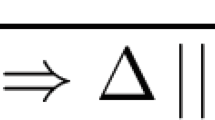Abstract
One of the problems we face in many-valued logic is the difficulty of capturing the intuitive meaning of the connectives introduced through truth tables. At the same time, however, some logics have nice ways to capture the intended meaning of connectives easily, such as four-valued logic studied by Belnap and Dunn. Inspired by Dunn’s discovery, we first describe a mechanical procedure, in expansions of Belnap-Dunn logic, to obtain truth conditions in terms of the behavior of the Truth and the False, which gives us intuitive readings of connectives, out of truth tables. Then, we revisit the notion of functional completeness, which is one of the key notions in many-valued logic, in view of Dunn’s idea. More concretely, we introduce a generalized notion of functional completeness which naturally arises in the spirit of Dunn’s idea, and prove some fundamental results corresponding to the classical results proved by Post and Słupecki.
Similar content being viewed by others
References
Arieli O., Avron A.: Reasoning with logical bilattices. Journal of Logic, Language and Information 5, 25–63 (1996)
Arieli O., Avron A.: The value of the four values. Artificial Intelligence 102, 97–141 (1998)
Asenjo F. G.: A Calculus of Antinomies. Notre Dame Journal of Formal Logic 7(1), 103–105 (1966)
Avron A.: On the expressive power of three-valued and four-valued languages. Journal of Logic and Computation 9, 977–994 (1999)
Avron A., Ben-Naim J., Konikowska B.: Cut-free ordinary sequent calculi for logics having generalized finite-valued semantics. Logica Universalis 1, 41–69 (2006)
Avron, A., and A. Zamansky, Non-deterministic semantics for logical systems, Handbook of Philosophical Logic, vol. 16, Springer, Berlin, 2011, pp. 227–304.
Batens D.: Against global paraconsistency. Studies in Soviet Thought 39, 209–229 (1990)
Bergstra, J. A., I. Bethke, and P. H. Rodenburg, A propositional logic with 4 values: true, false, divergent and meaningless, Journal of Applied Non-Classical Logics 5(2): 199–217, 1995.
Béziau, J.-Y., Bivalent semantics for De Morgan logic (the uselessness of four-valuedness), in W. A. Carnielli, M. E. Coniglio, and I. M. L. d’Ottaviano, (eds.), The Many Sides of Logic, College Publication, London, 2009, pp. 391–402.
Blamey, S., Partial logic, in D. Gabbay, and F. Guenthner, (eds.), Handbook of Philosphical Logic, vol. 5, 2 edn., Kluwer Academic Publishers, Dordrecht, 2002, pp. 261–353.
Carnielli, W., M. Coniglio, and J. Marcos, Logics of formal inconsistency, in D. Gabbay, and F. Guenthner, (eds.), Handbook of Philosphical Logic, vol. 14, Springer, Dordrecht, 2007, pp. 1–93.
Carnielli, W., and J. Marcos, A Taxonomy of C-systems, in W. A. Carnielli, M. E. Coniglio, and I. M. L. d’Ottaviano, (eds.),Paraconsistency: The Logical Way to the Inconsistent, Paraconsistency, Marcel Dekker, New York, 2002, pp. 1–94.
Carnielli, W., J. Marcos, and S. de Amo, Formal inconsistency and evolutionary databases, Logic and Logical Philosophy 8:115–152, 2000.
Copeland, B. J., The Church–Turing thesis, in Edward N. Zalta, (ed.), The Stanford Encyclopedia of Philosophy, Fall 2008 edn., http://plato.stanford.edu/archives/fall2008/entries/church-turing/, 2008.
Dunn, J. M., Contradictory information: too much of a good thing, Journal of Philosophical Logic 39(4):425–452, 2010.
Fitting, M., Kleene’s logic, generalized, Journal of Logic and Computation 1:797–810, 1990.
Fitting, M., Kleene’s three-valued logics and their children, Fundamenta Informaticae 20:113–131, 1994.
Ginsberg, M. L., Multivalued logics: A uniform approach to reasoning in AI, Computer Intelligence 4:256–316, 1988.
Gottwald, S., A Treatise on Many-Valued Logics, Research Studies Press, Baldock, 2001.
Jaśkowski, S., Investigations into the system of intuitionist logic, Studia Logica 34:117–120, 1975.
Malinowski, G., Many-valued logics, in L. Goble, (ed.), The Blackwell Guide to Philosophical Logic, Blackwell Publishing, Oxford, 2001, pp. 309–335.
Marcos, J., What is a non-truth-functional logic?, Studia Logica 92:215–240, 2009.
Mendelson, E., Introduction to Mathematical Logic, 4 edn., Chapman and Hall/CRC, Boca Raton, 1997.
Muskens, R., On partial and paraconsistent logics, Notre Dame Journal of Formal Logic 40(3):352–374, 1999.
Omori, H., and K. Sano, da Costa meets Belnap and Nelson, in R. Ciuni, H. Wansing, and C. Willkommen, (eds.), Recent Trends in Philosophical Logic, Springer, Berlin, 2014, pp. 145–166.
Omori, H., and T. Waragai, Some observations on the systems LFI1 and LFI1 *, inProceedings of Twenty-Second International Workshop on Database and Expert Systems Applications (DEXA2011), 2011, pp. 320–324.
Post, E., Introduction to a General Theory of Elementary Propositions, American Journal of Mathematics 43:163–185, 1921.
Priest, G., An Introduction to Non-classical Logic: From if to is, 2 edn., Cambridge University Press, Cambridge, 2008.
Pynko, A. P., Functional completeness and axiomatizability within Belnap’s four-valued logic and its expansions, Journal of Applied Non-classical Logics 9(1):61–105, 1999.
Restall, G., An Introduction to Substructural Logics, Routledge, London, 2000.
Ruet, P., Complete set of connectives and complete sequent calculus for Belnap’s logic, Tech. rep., Ecole Normale Superieure, 1996. Logic Colloquium 96, Document LIENS-96-28.
Sano, K., and H. Omori, An expansion of first-order Belnap-Dunn logic, Logic Journal of the IGPL 22(3):458–481, 2014.
Shramko, Y., and H. Wansing, Some useful 16-valued logics: how a computer network should think, Journal of Philosophical Logic 34:121–153, 2005.
Słupecki, J., A criterion of fullness of many-valued systems of propositional logic, Studia Logica 30:153–157, 1972.
Suszko, R, Remarks on Łukasiewicz’s three-valued logic, Bulletin of the Section of Logic 4(3):87–89, 1975. Reedition 2012 version available online.
Wansing, H., The power of Belnap: sequent systems for SIXTEEN 3, Journal of Philosophical Logic 39:369–393, 2010.
Wansing, H., and Y. Shramko, Harmonious many-valued propositional logics and the logic of computer networks, in C. Dégremont, L. Keiff, and H. Rückert, (eds.), Dialogues, Logics and Other Strange Things. Essays in Honour of Shahid Rahman, College Publications, London, 2008, pp. 491–516.
Woleński, J., and J. Zygmunt, Jerzy Słupecki (1904–1987): life and work, Studia Logica 48:401–411, 1989.
Author information
Authors and Affiliations
Corresponding author
Rights and permissions
About this article
Cite this article
Omori, H., Sano, K. Generalizing Functional Completeness in Belnap-Dunn Logic. Stud Logica 103, 883–917 (2015). https://doi.org/10.1007/s11225-014-9597-5
Received:
Published:
Issue Date:
DOI: https://doi.org/10.1007/s11225-014-9597-5



